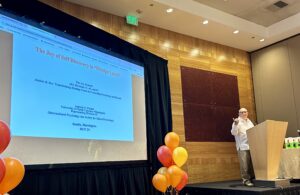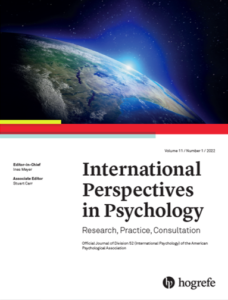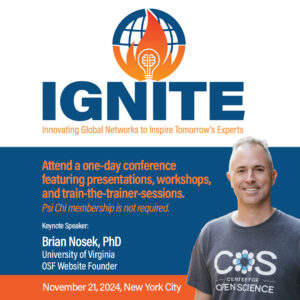
Fall 2024 – Volume 28, Issue 3
Table of Contents
Presidential Feature
- Borders that unite: Listening to the Global South
APA Conference and Diálogos Globales Program 2024
- Two Celebrations of the Diverse Work of International Psychologists Around the Globe
- Psicología en español, ecos de la Convención de la APA 2024, en Seattle
- Joy Summit at APA 2024: A Celebration of Healing through Justice & Joy
Division News
- APA Communities is LIVE!
- 2024 New Division 52 Fellows
- Division 52 Award Recipients
- Student-First-Authored Poster Contest Winners
Global Perspectives and Collaborations
- Eighty years and counting: What have we learned from autism research and what do we still need to learn?
- ATOP Meaningfulworld Humanitarian Mission to Armenia
Member Activities
- APA 2024 Denmark Award to Dr. Silvia Canetto
- 2nd Edition of Biopsychosocial Perspectives of Arab Americans
- Book Release: Fundamentals of Cultural Psychology
United Nations Activities
- Forum focused on helping at-risk children world-wide
- Psychology Day at the United Nations: Four Watch Parties
Student News
Webinars
International Perspectives in Psychology
- Featured Articles
Announcements and Opportunities
- IGNITE Psi Chi Research Conference 2024
- Ernst E. Boesch Prize 2025 – Call for Nominations
Artistic Expressions
- A Senior Pledge
Note from the Editors

Feature of President Pina Marsico, PhD
Borders that unite: Listening to the Global South
by Dr. Pina Marsico
President of Division 52 (International Psychology)
As humans, we live in a multi-bounded world we ourselves constantly create, regulate, and cross in order to modulate our relationship with the environment and with the others.
The human activity, indeed, takes place on the border between what already exists and that which could still come into being in the next moment. We live “in between” and borders are tools for finding directions in the infinite space of the world.
In this presidential address I brought the cultural perspective of bordering process to discuss the new global challenges in psychology. The exploration of the borders as an essential location where cultural processes emerge is the new frontier of psychological investigations. I will then apply the conceptual tools of bordering process to the urgent task of building a new integrated psychological sciences based on the premises that fit the realities of the World, from South to North and from East to West.
In my talk I gave priority the Global South focus in dialogue with the rest of the world with the goal to transcend institutional, economic, social, political, and geographical borders and to emphasize the common features of knowledge construction and innovation in a constructive and genuine dialogue with the Global North.
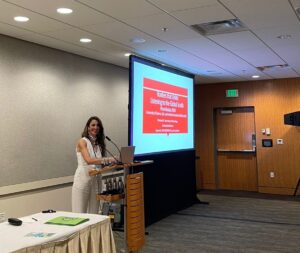
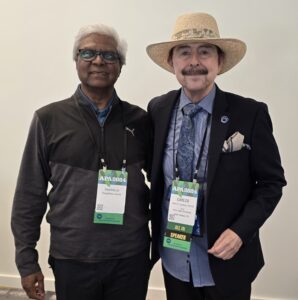
APA conference and Global Dialogues – Diálogos Globales Program 2024: Two Celebrations of the Diverse Work of International Psychologists Around the Globe
by Antonio Valdivia, PhD and Carlos Zalaquett, PhD
In an effort to continue advancing the work of international psychologists, Division 52 has produced two major programs this year: the APA Conference Presentations and Posters, and the Global Dialogues-Diálogos Globales Program 2024. These initiatives provided great platforms for sharing research, fostering collaboration, and promoting dialogue among psychologists from diverse backgrounds and places in the world. The APA Conference Presentations and Posters allowed for the dissemination of innovative research findings, while the Global Dialogues program facilitated discussions on global psychological issues and practices. Together, these programs contributed to the ongoing development and recognition of international psychology.
Division 52 APA Highlights
The APA Conference 2024 had a profound impact on the field of psychology by fostering cross-cultural understanding and collaboration. It featured a wide range of topics, including women’s rights, global LGBTQ+ realities, and the adaptation of psychological instruments to Spanish language, which broadened attendees’ perspectives and encouraged a more inclusive approach to psychological practices. The conference also played a crucial role in strengthening professional networks through both in-person and virtual poster sessions, skill-building presentations, and discussions on global challenges such as trauma and uncertainty. The Division 52 Presidential Address and business meeting provided additional opportunities for recognition and collaboration, further enhancing the event’s overall impact. Notably, this conference marked the first time presentations in Spanish were delivered, including a keynote session by the President of the Society of Interamerican Psychology (SIP). This session focused on the current state of the psychology profession in the Americas and explored future collaborative opportunities between SIP and APA organizations. Additionally, the session titled “Adaptación de instrumentos psicológicos estadounidenses al idioma español: Oportunidades y retos” addressed the challenges and opportunities involved in developing Spanish editions of assessment tools originally designed for English-speaking populations. These highlights underscore the conference’s commitment to inclusivity and the advancement of international psychology.
Division 52 Global Dialogues-Diálogos Globales Program Highlights
The Global Dialogues-Diálogos Globales Program, introduced this year by our Division 52, represented a significant and innovative addition to the conference. It featured 27 presentations, including six conducted in Spanish, covering a wide array of topics within global psychology. These presentations tackled important issues such as ethics, immigration, climate awareness, dismantling white dominant spaces, the specific needs of Spanish-speaking psychologists, the effectiveness of hostile environment awareness training, cultural adaptations of psychotherapy, social justice implications, mentoring programs, transnational family dynamics, psychoncological approaches around the Americas, and perceptions of online learning, among others. Presenters hailed from a diverse array of countries, including the United States, Italy, South Africa, Spain, Mexico, Chile, South Korea, Argentina, Puerto Rico, Cuba, Peru, El Salvador, Colombia, Brazil, Lebanon, and the United Arab Emirates, enriching the discussions with their varied perspectives and insights. The format for these presentations included in-person and virtual presentations allowing for broader participation and engagement. This program not only highlighted the global nature of psychological practice but also emphasized the importance of addressing contemporary issues throughout the world, with a collaborative and inclusive lens.
Both of our programs honored the Asuncion Accord Asuncion Accord
The Asuncion Accord is an agreement between Division 52, the Sociedad Interamericana de Psicologia (SIP), and the American Psychological Association (APA), designed to align efforts and resources to promote and advance psychology in the Americas. Key objectives include the harmonization of membership costs, the promotion of multilingual communication, the expansion of the existing Memorandum of Understanding (MoU), and the implementation of joint activities to foster better collaboration. Following the guidance provided by the Asuncion Accord, both of our programs promoted multilingual communication to allow greater inclusion and diversity in presentations, workshops, and posters, all of which enriched the exchange of knowledge, strengthened professional networks, and allowed for greater collaboration and knowledge transfer among psychologists from different countries. The creation of a joint decolonization academy may drive significant changes in the way psychology is approached, promoting more inclusive and culturally sensitive practices in the future.
Future Steps
To continue the progress initiated by the Asuncion Accord, it is crucial to implement a series of future steps. In the short term, the success of the initiatives should be ensured through the expansion of APA’s Division 52 practices in 2025 and the promotion of these type of activities to entire APA. It is essential to continue strengthening collaboration between both organizations and beyond. The organization of regular meetings and formal activities at APA and SIP conventions
could foster the building of strong and ongoing relationships among members of both
institutions, and could serve as an example for the development of similar agreements with other international organizations. In the long term, the creation of the joint decolonization academy should be a priority, aimed at establishing educational and training programs that address the specific cultural and contextual needs of different regions in the world. Furthermore, the development of continuing
education events in various languages will contribute to the professionalization and constant updating of psychologists around the globe.
Psicología en español, ecos de la Convención de la APA 2024, en Seattle
by Julio C. Penagos-Corzo, Universidad de las Américas Puebla, México
En la historia de la American Psychological Association (APA), la inclusión de una conferencia invitada en español durante su convención anual de 2024 representó un hito sin precedentes. Tuve el honor de presentar la ponencia titulada Psicología en las Américas: más allá del Río Bravo/Grande: Un viaje a través de la historia, la colaboración y la diversidad. Lo anterior es un avance para la voz de la psicología generada en América Latina, y un avance para la accesibilidad y diversidad lingüística en foros internacionales de gran magnitud.
La apertura a las diferentes voces se reflejó en la cálida recepción de esta conferencia. El intercambio académico puede tornarse vibrante, si como en este caso, asistentes de diversas regiones del continente expresan su entusiasmo al participar en un evento presentado en su lengua materna o en una que les resulta familiar y apreciada.
La emoción palpable en la audiencia fue un reflejo del reconocimiento de la diversidad cultural y, a la vez, una reafirmación de la identidad y el valor de las contribuciones realizadas en español. Esto subraya la importancia de la representación de diversas lenguas y la inclusión lingüística tanto en publicaciones científicas como en eventos académicos, donde el inglés ha sido tradicionalmente la lengua dominante.
En la ponencia se hizo un mínimo recorrido por la historia de la psicología contemporánea en América Latina, destacando aspectos poco conocidos como los primeros laboratorios y figuras clave, mujeres y hombres que sentaron las bases de nuestra disciplina en la región. Sin duda, la participación de estas figuras y la de la Sociedad Interamericana de Psicología (SIP), que siempre ha realizado acciones para tender puentes entre las y los profesionales de la Psicología en las Américas, ha fructificado en una red de colaboración muy amplia en nuestros días. Lo anterior fue ilustrado con la presentación de mapas de coautoría que mostraron gráficamente la amplia red de colaboraciones de psicólogas y psicólogos de Latinoamérica y colegas de otras regiones. Estos mapas permitieron iluminar la riqueza y complejidad de las relaciones académicas en nuestra región, resaltar la creciente integración de la psicología latinoamericana en el panorama global e, incluso, encontrar áreas con posibilidades de desarrollo.
Es de vital relevancia destacar que presentaciones como ésta, significan la oportunidad de plantear cuestiones que a menudo quedan relegadas en los congresos internacionales debido a barreras idiomáticas. Al presentar en español, se abrió un espacio para discutir ideas que, por no haber sido expresadas en inglés, muchas veces “no existen” en la corriente principal de la literatura científica. Resulta entonces imperativo promover la diversidad lingüística como un medio esencial para ampliar y enriquecer el conocimiento global en nuestra disciplina más allá del gesto de inclusión y su poder simbólico.
Es importante destacar que este logro no es personal; es el resultado del esfuerzo y la colaboración de colegas enormes. Años de acuerdos y trabajo conjunto entre la SIP y la APA sentaron las bases para que esta presentación fuera posible. Desde la firma del Memorándum de entendimiento hasta el acuerdo de Asunción y los “Horizontes de colaboración SIP-APA”, cada paso ha contribuido a abrir nuevas oportunidades para el intercambio académico y la colaboración entre profesionales de la psicología de todo el continente.
Más allá del contenido de la ponencia, esta experiencia permite reflexionar sobre el impacto de las convenciones y congresos en la gestación de ideas y la creación de redes de colaboración. Estos eventos son, en muchos sentidos, fábricas de ideas donde germinan nuevos proyectos, se fortalecen alianzas y se trazan las rutas para futuros desarrollos en la disciplina. Además, presentar en español es el reconocimiento a la labor de psicólogas y psicólogos hispanohablantes, y un recordatorio de la importancia de mantener vivas nuestras lenguas y culturas en el ámbito académico.
La Convención de la APA 2024 reafirmó la convicción de que la diversidad lingüística y cultural es esencial para el avance de la psicología a nivel global. Al compartir nuestras historias, colaboraciones y desafíos en nuestra lengua materna, contribuimos a construir un campo más inclusivo, enriquecido, capaz de enfrentar los retos del futuro con una perspectiva verdaderamente global y diversa.
Joy Summit at APA 2024: A Celebration of Healing through Justice & Joy
This past August, Division 52 partnered with Division 17 to co-host the Joy Summit! In support of Division 17’s Presidential Initiative, the Justice & Joy: Transforming Healing Praxis in Counseling Psychology and Beyond campaign, our Division 52 members engaged participants in a transformative journey of healing. The Joy Summit, held the day before the APA 2024 Convention, explored the intersection of justice and joy in mental health, addressing critical questions about individual and collective well-being. Division 52’s Past-President Antonio Puente delivered a powerful keynote address, offering insights into how joy and justice can serve as foundations for healing practices in counseling psychology. The summit featured workshops and interactive sessions where attendees explored new models of well-being that integrated social justice with the healing power of joy.
The event also introduced the Joyography resource guide, developed by the Joy and Justice Initiative. This guide serves as a framework for understanding the role of joy in healing, social justice, and advocacy. It offers reflections and resources on the psychology of joy, its cultural context, and how oppression impacts well-being. The Joyography is a living document that invites contributions from users to further explore the connections between joy, justice, and mental health.
This event was a significant step in reimagining healing practices that uplift both individual and collective thriving. We look forward to seeing how these discussions will continue to shape our field in the years to come.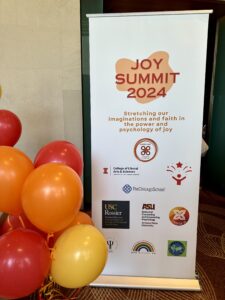
APA Communities is LIVE! Start a conversation today!
https://community.apa.org/

As a member of APA and Division 52, you have access to APA Communities.
APA Community is exclusively designed for APA members to forge meaningful connections, exchange personal and professional highlights, and stay up-to-date on the latest in psychology. From sharing life moments to exploring cutting-edge psychological research and news, APA Community invites you to engage and foster deeper connections with your fellow members.
We encourage you to access the Division 52: International Psychology Group and connect with your fellow Division 52 members. Start a conversation, post a current event, or share about your work to other Division 52 members. In the coming months, we will be actively engaging in the Division 52 Communities Group and rolling out new features and ways to connect. Click on https://community.apa.org/ to get started!
For questions, reach out to Joyce Yip Green, Division 52 Communities Liason
Division 52 Congratulates its new 2024 Fellows and the recipients of its 2024 Awards!!!
2024 New Division 52 Fellows
Theodore Bartholomew, PhD – Scripps College (new APA Fellow)
Melissa Morgan, PhD – Adler University
Matthew Skinta, PhD – Roosevelt University
Luca Tateo, PhD – University of Oslo (new APA Fellow)
Jyotsna Vaid, PhD – Texas A&M University
Yu-Wei Wang, PhD – University of Maryland
Division 52 Award Recipients – see online with videos here: https://div52.net/archive/2024-awardees/
 Outstanding International Psychologist
Outstanding International Psychologist
Dr. Merry Bullock
Ahimsa International
Outstanding Early Career Psychologist Award
Dr. Madeline Stenersen
Saint Louis University
Denmark-Reuder Women and Gender Award
Dr. Caterina Arcidiacono
University Federico II, Naples
Henry David International Mentoring Award
Dr. Eric Youngstrom
Ohio State University
Jean Lau Chin Award for Outstanding Psychologist in International Leadership Contributions
Serdar M. Değirmencioğlu
Jean Lau Chin Award for Graduate Student in International Leadership Contributions
Nokwanda Grava
Purdue University
Anastasi Graduate Student Research Award
Chongzheng Wei
UC Santa Barbara
Student International Research Award
Khushboo Patel
University of Louisville
Global Citizen Citation Award
Alejandro Arnaldo Barroso Martinez
School of Medicine, University of Valparaíso, Chile
Student-First-Authored Poster Contest at APA Awarded
* The opinions, information, opportunities, and materials expressed in this member-dedicated section are not necessarily supported by Division 52. Publication in this section does not constitute agreement or support from the Division.
Eighty years and counting: What have we learned from autism research and what do we still need to learn?
Chrystina A. Dolyniuk, Ph.D., Rider University
I recently returned from Europe, where I was immersed in community-based research that focused on the perspectives and needs of children with autism. This recent professional experience resulted in some personal reflection on two integral questions: “What is autism?” and “What have we learned from eighty years of autism research?”
Dr. Leo Kanner first introduced autism to the world more than eighty years ago. Since that time, thousands of clinical, theoretical and research studies have been published documenting the clinical characteristics of the autism spectrum, describing its’ symptoms, validating best practices. and suggesting ways to integrate people on the spectrum into communities.
In eighty years, we have certainly come a long way in understanding that autism involves social communication deficits and repetitive behaviors, and we have even accepted the reality that autism is relatively common. Worldwide, the prevalence of autism is believed to be 1 in 100 (Zeidan, Fombonne, & Scorah, et. al., 2022), or at least 1% of the human population. In countries like the United States, where awareness and sensitivity to the condition are great, numbers are as high as 1 in every 36 individuals (CDC, 2023).
Over the last eight decades, researchers have learned a great deal, not the least of which is an understanding that autism is clearly not one thing. While our conceptual understanding of a spectrum fares well in providing opportunities for individual acceptance and planning of services, it still does not allow us to accurately describe all individuals with the condition. I challenge researchers to stop trying, and do so with the utmost respect for all people with autism around the globe.
Every person develops differently within every context, surrounded by specific resources, including other individuals. Every individual’s outcome is a complex interaction of who they are, and, more importantly, how they fit best into their surroundings. And, as studies have shown, we cannot underplay any one force in these reciprocal exchanges. This understanding of reciprocal relationships between environment and nature, or individual within context, have become the underlying basis for contemporary developmental theories (Lerner, 2018; Bronfenbrenner, 1994).
While science encourages us to look for causal relationships between variables, the reality is that it is nearly impossible to predict what causes autism, nor can we prevent it. At this point in time, we can confidently say that decades of empirical studies have not yet identified why autism exists. While we understand that there are risk factors and genetic predispositions that are associated with Autism Spectrum Disorder (ASD), we also know that it is sometimes possible to avoid diagnosis when appropriate early intervention is provided. Furthermore, it is likely that the spectrum is the result of multiple factors, and some of those factors simply cannot be controlled. Thus, instead of focusing on what causes autism, I propose we take the next eighty years of research in a totally different direction.
ASD is not a tragedy, it is a developmental difference, a challenge that today’s American children are quite familiar with. Today’s American society doesn’t need to take part in any more community awareness events. Americans need to be educated on how to celebrate people on the spectrum and how those individuals can live successfully in the world. Consequently, there has been rigorous discussion about renaming April as “Autism Acceptance” (rather than “Awareness”) Month in the United States.
While this idea is certainly appropriate in the United States, my experience suggests that awareness of the spectrum still needs to be promoted globally. This is evident in the fact that while inclusion and community integration may be practiced in some countries, educational justice and inclusive practices are not upheld in many countries around the globe. As is noted by the World Health Organization (2023), people with autism are often subject to stigma and discrimination, including deprivation of healthcare, education and community participation. This type of widespread injustice is not specific to individuals on the autism spectrum, as similar forms of “ableism” have been noted by disability advocates concerned with a variety of physical, cognitive and developmental differences (European Disability Forum, 2023; World Health Organization, 2023). My recent firsthand professional experiences have also confirmed that while some European countries are moving toward supporting full acceptance of people on the spectrum, many myths are perpetuated globally, including misunderstandings about autism being an illness, resulting from vaccination, and treatable using diets and sensory integration. Some myths may persist because large groups of people with a variety of cultural beliefs continue to migrate across continents, as a result of significant historic events including war, oppression, or even genocide. These events must be conceptualized within the autism scheme, since all individuals are vulnerable to them, but those with developmental differences are often left behind, forgotten, or overlooked.
Therefore, moving forward, I believe we still need to push the importance of evidence-based research and to encourage a stronger understanding of how autism presents in various countries around the globe. We also need to interpret, assess and prioritize autism based on cultural agendas, values, and significant historic events. In fact, a review authored by prominent autism researchers several years ago noted that autism services are lacking in many developing countries due to a variety of social barriers (Rosen, Lord & Volkmar, 2021). My recent experiences confirm that these problems persist in part due to systemic misunderstanding that autism is not a determinant of negative outcome, but rather a complex human characteristic that shapes thinking and demands individualized support and compassion.
Without a doubt, autism is observed around the globe. It is a neurological difference in processing social and sensory information and it results in behavioral differences which may or may not be misinterpreted in a variety of contexts. Autism is also understood and appreciated differently in a variety of places around the world because there is cross-cultural disparity in general exposure, understanding and acceptance of autism. Moreover, autism is simply not a priority in some places.
Science has taught us that neurons generate new neural pathways when there is an opportunity for new experiences. Clearly then, all people, both on and off the spectrum, can generate new ways of understanding each other, if given the opportunity. Let’s re-conceptualize autism as a human characteristic, thereby truly accepting an ideal of “neurodiversity”.
Only when we accept that clinical criteria and quantitative factors have discrete limits, will we fully appreciate that adherence to controlled studies and hard science will never fully describe all people on the spectrum. Dr. Kanner described autism characteristics eighty years ago and subsequent research has documented our understanding of those traits. But Kanner did not describe all individuals with autism, something that only first-hand experience, qualitative data, and a thorough analysis of history and cultural context must document. From this point forward, let’s put a human face on the spectrum and recognize that autism should be understood as a persistent human quality that exists in individuals around the world. The diversity of experiences lived by these individuals is in flux and unpredictable. Autism cannot be, nor should it be, defined by science alone. Autism is, of course, as diverse as the human beings diagnosed with it.
References
Bronfenbrenner, U. (1994). Ecological models of human development. In International
Encyclopedia of Education, vol. 3, 21nd Ed. Oxford: Elsevier. Reprinted in: Gauvain, M. & Cole, M. (Eds.), Readings on the development of children, 2nd Ed. pp. 37-43. NY: Freeman Press.
Centers for Disease Control and Prevention (2023). Community Report on Autism. Autism and Developmental Disabilities Monitoring Network: A snapshot of Autism Spectrum Disorder among 4-year-old and 8-year-old children in multiple communities across the United States in 2023.
European Disability Forum (2023). Welcome to EDF, retrieved from: https://www.edf-feph.org/
Lerner, R.M. (2018). Concepts and Theories of Human Development (4th ed.). Routledge. https://doi.org/10.4324/9780203581629
Rosen, N.E., Lord, C., & Volkmar, F. (2021). The Diagnosis of Autism: From Kanner to DSM-III to DSM-5 and Beyond. Journal of Autism and Developmental Disorders, 51, 4253-4270.
World Health Organization (2023). Autism, November 15, 2023, retrieved from: https://www.who.int/news-room/fact-sheets/detail/autism-spectrum-disorders
Zeidan, J., Fombonne, E., Scorah, J., Ibrahim, A., Durkin, M., Saxena, S., Yusuf, A., Shih, A., & Elsabbaugh, M. (2022). Global prevalence of autism: A systematic review update. Autism Research, 15(5): 778-790.
ATOP Meaningfulworld Humanitarian Mission to Armenia
Trauma healing, Transforming Horizontal & Generational Trauma, & Nurturing Emotional Intelligence and Self-care
Why did we return to Armenia? There have been multiple traumatic events taken place with bordering Azerbaijan. The past 5 years have been bloody; wars, blockade, and ultimately the ethnic cleansing in 2023 has had devastating consequences on the population who are displaced. Approximately 110,000 Armenians residents were displaced across Armenia in villages, towns, and many have left the country due to unemployment, and scarcity of resources.
Our objectives were 1. Transform trauma of ethnic cleansing took place in Sept 2023 by Azerbaijan, 2. Transform Horizontal Violence, 3. Transform domestic violence, 4. Continue suicide prevention awareness, 5. Continue Ecological awareness, 6. Provide energetic healing, 7. Teach 7-step modality, 8. Nurture Gender empowerment, 9. Compile the oral histories of Artsakh survivors.
From 30 April to 12 May 2024, MeaningfulWorld team volunteered in Armenia for a follow up Humanitarian Outreach Mission. Dr. Kalayjian initiated and led the first outreach mission immediately after the devastating earthquake in 1988; since then, we have continued to volunteer consistently in Armenia over 25 humanitarian missions. Our team was comprised of Margo Sargsyan & me. We emphasized collecting oral histories, and helping heal the survivors who were thrown out of their homes in Artsakh, (AKA Nagorno-Karabagh). Trauma that is healed will help nurture Post-Traumatic-Growth (PTG) and prevent transmission of post-traumatic stress disorder (PTSD) to the next seven generations, as well as to prevent Horizontal Violence. We specifically used the 7-step Integrative Healing Model, tapping solution, meditation, breathwork, energy healing, Flower Essences (FES), essential oils, & Soul-Surfing.
Link to newsroom full feature here
While in Armenia, we worked with over 25 families from Artsakh in different regions. We observed improvements in their mental health (since October 2023), as most were settled in their new homes, and some had employment, and others searching for one. Children were attending schools, and universities, although searching for their friends and classmates, and yearning for their homes in Artsakh. Most expressed feelings of fear of continuing to lose lands to Azerbaijan, worry about uncertain political situation with neighbors who are not only unfriendly, but also full of hatred, and high levels of anxiety. In many workshops people expressed feelings of anxiety and fear on levels of 7-10 (10 being the most severe), after our interventions and tapping, we were able to bring those levels down to 2-3. Which is a great success, and evidence for people to continue using these modalities on their own. Some psychologists who participated shared “After your stretches, workshop, & soul-surfing, I felt so relaxed and I was able to sleep for the first time so soundly, as never before.” Expressions such as “Your method is incredibly healing, thank you for your time and passion,” exemplified their expressions.
Another participant from Artsakh wrote on Facebook, “I received such positive energy meeting you and working with you. The oils and Flower Essences you gave helped me tremendously. Since the war I have been getting anxiety attacks, and as soon as I felt the symptoms, I picked up your lavender oil and rubbed it as you directed, then sprayed the Flower Essence of Peace & Justice, and I slept so soundly for the first time. May God Bless you always.” We provided emotional healing through emotional managements, mindfulness, breathwork, also gifted essential oils of lavender & rosemary, and Flower Essences donated by Flower Essence Society, www.Fesflowers.com. Flower Essence Services
We had several presentations at the Yerevan State University, special gratitude to Robert Sukiasyan, as well as the American University of Armenia. Our topics ranged from Genocide Prevention, denial as the last stage of Genocide, stress awareness & management, & self-care using our signature 7-step Integrative Healing Model.
We nurtured our previous collaborators, and we forged new NGO’s and other volunteer organizations. Special gratitude to Anush Martirosyan (Co-Founder | Transparent Armenia Charitable Foundation) who provided contacts of the Artsakhian families and Anna Aslanian from Union Forte Volunteering Organization who connected us with three amazing volunteers.
Link to Bari Luys
APA 2024 Denmark Award to Dr. Silvia Canetto
 Congratulations to Silvia Sara Canetto, Ph.D., Psychology Professor, Colorado State University, USA who received APA Society-for-the-Psychology-of-Women’s 2024 Denmark award for research on women and aging.
Congratulations to Silvia Sara Canetto, Ph.D., Psychology Professor, Colorado State University, USA who received APA Society-for-the-Psychology-of-Women’s 2024 Denmark award for research on women and aging.
Canetto’s scholarship is on gender scripts of older-adult unassisted– and assisted-suicide/hastened-death.
 2nd Edition of Biopsychosocial Perspectives of Arab Americans
2nd Edition of Biopsychosocial Perspectives of Arab Americans
Editors: Sylvia C. Nassar, Kristine J. Ajrouch, Florence J. Dallo, Julie Hakim-Larson
The biopsychosocial study of Arab Americans yields compelling insights into innovative theoretical and applied initiatives. In the context of a growing population of Arab Americans, coupled with the current tenure of xenophobia and exposed structural racism in the US, clinical and community practitioners must be attuned to their clients of Arab ancestry, whose experiences, development, and health concerns are distinctly different than that of their White counterparts. This second edition, with its uniquely interwoven sections of culture, psychosocial development, and health and disease, provides a rich overview of timely, critical topics. The audience for the text includes counselors, social workers, psychologists, nurses, psychiatrists, sociologists, and any other public and mental health practitioners, researchers, and policy makers who work with and on behalf of clients and patients of Arab descent. The authors represent a team of leading experts spanning disciplines of sociology, clinical mental health, and community public health.
“This edition draws on leading experts in Arab American health and sociology who document the complexity of this population’s immigration and acculturation experience. It offers critical and current research that speaks to the centrality of context and diversity in treating Americans of Arab descent. Contributors explore the complex and limited racial framework within which Arabs in the U.S. form their identities, and the impact of structural racism on their lives and health. This collection offers practitioners much needed insights on a population often hidden or rendered invisible by data limitations, and yet misrepresented by cultural stereotypes.”
 New Book Release: Fundamentals of Cultural Psychology
New Book Release: Fundamentals of Cultural Psychology
by Luca Tateo
This innovative textbook is the ideal introduction to cultural psychology. It focuses on a holistic approach, which emphasizes that culture is created and shared by minds and society.
Organized around short core concept chapters, the book encourages students to think critically about culture and the theories around it. Chapters explore what cultural psychology is and its forms of knowing, how cultural psychology can be used to understand higher psychological functions, and the human psyche as a whole. Each chapter contains definitions of key concepts, real-world examples from everyday human activities, reflection questions, short biographies of key figures relevant to cultural psychology, and chapter summaries. There are also links to video interviews from leading international scholars which provide critical reflections on core concepts in cultural psychology.
https://www.routledge.com/Fundamentals-of-Cultural-Psychology/Tateo/p/book/9781138576872
Forum Focused on Helping At-Risk Children World-Wide
“How can psychologists best help the world’s millions of at-risk children today?” This urgent question was the focus of a public forum on July 25, 2024, at Fordham University in New York City.
The forum’s keynote speaker was clinical psychologist Dr. Niels Peter Rygaard from Denmark, who spoke about “A global intervention to educate mental health staff.” Rygaard won the 2020 APA International Humanitarian Award for his work with at-risk children in 36 nations. [See Note 1 below.]
Rygaard described how his legendary career began in 2005 with his publication of ”Severe attachment disorder: A guide to practical therapy.” He soon formed Fairstart Foundation as a new global association to develop global programs to train indigenous child-care workers in school, orphanages, and diverse institutions. From 2008-2013, Fairstart served 13 European nations. More recently, Fairstart has developed multilingual, online training modules, awarding a certificate to local workers who complete the training. Fairstart has now taught 800 graduates serving 700,000 at-risk children in 36 nations on 5 continents. The Fairstart website offers diverse resources. [2]
This forum was moderated by Dr. Harold Takooshian of the Psychology Coalition at the United Nations (PCUN). [3] It featured two discussants: Dr. Marciana L. Popescu of the UN NGO Committee on Migration, and Fordham Dean Elaine P. Congress. This forum ended with lively audience dialog about at-risk children, and a book-signing of Rygaard’s new book on “Children around the world,” with Julia Larock and Elaine P. Congress. [4]
This forum was arranged by Fordham University and PCUN, in cooperation with several professional groups: Psi Chi and SPSSI-NY. [5] For any details, contact takoosh@aol.com
Notes: 1. APA Award: www.youtube.com/watch?v=Epmju564FTU
- Fairstart: www.fairstartfoundation.com
- PCUN: http://psychologycoalitionun.org
- Books: www.infoagepub.com/series/International-Psychology
5. SPSSI-NY: www.spssi.org/ny


Psychology Day at the United Nations: Four Watch Parties on April 25, 2024
As hundreds of us psychologists and students around the globe joined the UN Psychology Day webinar, how many of us would like to gather with others in a local “watch party?”
On April 25, 2024, an estimated 818 people in 75 nations participated in the Psychology Day webinar. As an experiment in 2024, a handful of PCUN representatives kindly agreed to host a watch party in at least four cities. These were announced 8 weeks in advance: New York City, Rochester NY, Los Angeles, and Geneva, Switzerland.
As it turns out, a handful of participants in these four cities enjoyed meeting each other, but the numbers were small, compared with 818 who participated online. The 150-minute video is available at: https://www.psychologydayun.com/
Rochester, NY
Reported by Katlyn Rice
Since 2019, the University of Rochester Medical Center (URMC) has hosted a watch party for UN Psychology Day for psychology faculty and trainees (doctoral interns and postdoctoral fellows) to drop in between appointments. A total of 40 people came by in 2024, about 10 at any one time, including several psychology trainees, psychologist and URMC Chief Wellbeing Officer Dr. Craig Rooney, and psychologist and University President Dr. Sarah Mangelsdorf.
Los Angeles
Reported by Tara Pir
The Institute for Multicultural Counseling and Educational Services (IMCES), as an NGO with ECOSOC status, has been associated with the United Nations for decades. For years, IMCES sponsored “Psychology Day at the UN”. The “Watch Party” this year innovatively served the purpose by having local gatherings. Although the number was small, the goal was accomplished and hopefully with more participants next year. IMCES headquarters is located in the heart of Los Angeles on the 20th floor. Attendance included psychologists, postdoctoral residents, predoctoral interns, and staff from different departments. The presentation was impressive. The spirit of entrepreneurship to provide and promote SDGs was admirable!

Geneva, Switzerland
Reported by Kelly O’Donnell
We were a small but significant group who met in a state-of-the-art classroom at the Geneva Graduate Institute of International and Development Studies. Thirteen people confirmed and five came in person (two international psychologists, an intern focusing on staff wellbeing at a UN humanitarian agency, an anthropologist and maternal health advocate-tech innovator, and a coordinator for graduate student services). Four of us stayed afterwards for 45 minutes for a lively interaction about what we appreciated and learned as well as what we questioned or wanted more information about.

New York City
Reported by Matthew Dos Santos
All New Yorkers were invited to Fordham University’s Manhattan campus. During 3 hours, 12 students and professionals from several institutions enjoyed networking over coffee and snacks. PCUN President David Livert addressed the webinar. PCUN book Editor Julia Larock displayed her new book on “Children around the world,” at a table displaying all 5 PCUN volumes. Editor Neha Srinivas welcomed us to submit reports from our NGO to her APA International Psychology Bulletin. Elaine Olaoye described the activities of her International Council of Psychologists.

The 2024 APA Conference in Seattle was a vibrant event for intellectual exchange and professional development, particularly for students interested in international psychology. Division 52, the International Psychology Division, offered various opportunities specifically designed for students to engage, learn, and contribute to the field.
1. Student Poster Sessions
A highlight of student involvement during the convention was the poster sessions, where students showcased their research and projects. This provided a fantastic opportunity for students to present their work to a diverse audience, receive feedback, and gain recognition within the international psychology community. Participating in these sessions enhanced students’ presentation skills and contributed to their professional visibility. Division 52 once again held the student-first-authored poster contest that recognized posters that address global and cross-national topics, include multi-national datasets or collaborators, or use data collected in a country outside the U.S. and/or the researchers originate from countries other than the U.S.
2. Networking Opportunities
Networking played a crucial role in career development, and Division 52 facilitated multiple avenues for students to connect with established professionals and peers. Dedicated networking sessions and mixers allowed students to meet and interact with international psychologists, potential mentors, and fellow students. On the first day of the convention, the Division 52 Student Committee hosted a coffee social with Division 48 (Peace Psychology) to welcome students and help them connect with mentors in the division. On the second day, Division 52 hosted a student and ECP Mixer at Din Tai Fung. These gatherings were invaluable for building relationships, sharing research interests, and exploring collaborative opportunities.
3. Student Competitions and Awards
Division 52 was committed to recognizing and celebrating student excellence. Several awards and competitions were held to acknowledge outstanding student research and contributions. These awards offered a platform for students to gain recognition for their hard work and innovative ideas. We would like to recognize:
• Nokwanda Grava from Purdue University for winning the Jean Lau Chin Award for Graduate Student in International Leadership Contributions
• Khushboo Patel from University of Louisville for winning the Student International Research Award.
• Chongzheng Wei from UC Santa Barbara for winning the Anastasi Graduate Student Research Award
The 2024 APA Conference in Seattle, through Division 52, offered a wealth of opportunities for student involvement. Whether through workshops, networking, poster presentations, competitions, mentorship, or volunteering, students found numerous ways to engage with the international psychology community, enhance their professional skills, and make meaningful connections. It was an exciting time for students to immerse themselves in the field of international psychology and make a lasting impact.
Neha Srinivas, Division 52 Student Chair 2024
nehasrinivas16@gmail.com
Olivia Mounet, Division 52 Student Chair Elect
omounet@fielding.edu

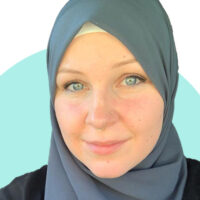
Upcoming Webinars:
Time: 9 am ET/13:00 UTC/14:00 CET
Webinar – Reproductive Justice: A Special Issue of International Perspectives in Psychology
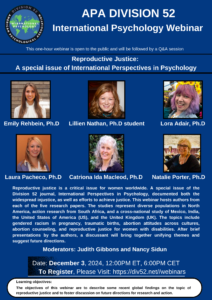
International Perspectives in Psychology: Research, Practice and Consultation
Ines Meyer, School of Management Studies, University of Cape Town, South Africa
Mendiola (Joy)Teng-Calleja, Ateneo de Manila University, Quezon City, Philippines
Current Issue:
Volume 13, Issue 3: 2024 https://econtent.hogrefe.com/toc/ipp/current
IPP Featured Articles
The International Perspectives in Psychology Journal is excited to share this month’s featured articles with all of you!
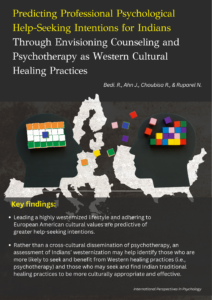 Predicting Professional Psychological Help-Seeking Intentions for Indians Through Envisioning Counseling and Psychotherapy as Western Cultural Healing Practices
Predicting Professional Psychological Help-Seeking Intentions for Indians Through Envisioning Counseling and Psychotherapy as Western Cultural Healing Practices
by Bedi. R., Ahn J., Choubisa R., & Ruparel N.
Frank and Frank’s (1991) model posits that common factors shared by all healing methods are responsible for their therapeutic benefits and that cultural influences shape these factors. Based on discrepancies in mental health service use worldwide and cross-cultural differences in the conceptualization of mental distress and wellbeing, this study investigated Indians’ intentions to seek professional help from a frame of psychotherapy as a (Western) culturally-encapsulated healing method. Using a sample of 377 university students from India, the predictive ability of six cultural variables (Asian values, European American values, importance of one’s ethnic group to their identity, commitment to one’s ethnic group, westernization, and cultural mistrust), derived from Frank and Frank’s (1991) common factors model, was examined. The results suggest that leading a highly westernized lifestyle and adhering to European American cultural values are predictive of greater help-seeking intentions. Thus, rather than a cross-cultural dissemination of psychotherapy, an assessment of Indians’ westernization (as indicated by their lifestyle and cultural values) may help identify those who are more likely to seek and benefit from Western healing practices such as psychotherapy and those who may seek and find Indian traditional healing practices to be more culturally appropriate and effective.
The findings justify the examination of cultural variables, such as European American values and Western lifestyle, in predicting the professional psychological help-seeking intentions of Indians. This type of information helps identify which individuals are likely to use counseling or psychotherapy in times of distress and which would be more likely to use and perhaps benefit more from culturally Indigenous healing practices to maximally promote their well-being. The results help promote the 2016–2030 UN Sustainable Development Goal 3: Ensure healthy lives and promote well-being for all at all ages.
 Perfectionism, Psychological Distress, and Career Indecision Among Chinese College Students: The Mediation Effect of Coping
Perfectionism, Psychological Distress, and Career Indecision Among Chinese College Students: The Mediation Effect of Coping
by Lu Tian and Zhijin Hou
Abstract: To aid in developing effective interventions on perfectionism, it is important to understand how different types of perfectionism may relate to psychological outcomes and identify possible mechanism explaining their relationships among Chinese college students. To address the problem, the present study examined (a) how adaptive perfectionism and maladaptive perfectionism were associated with psychological distress and career indecision among Chinese college students and (b) how coping mediated the relationships between two forms of perfectionism and psychological distress and career indecision. The results of path analysis models using a sample of Chinese college students (total n = 389) indicated that (a) maladaptive perfectionism was positively associated with psychological distress (r = .48) and career indecision (r = .31), while adaptive perfectionism was not associated with psychological distress (r = .12) and career indecision (r = −.05); (b) coping served as a suppressor and fully mediated the relationships between adaptive perfectionism and psychological distress (Bid = −.07, p < .01, CI99.5 = −.17, −.04) and career indecision (Bid = −.11, p < .001, CI99.5 = −.12, −.01); and (c) coping partially mediated the relationships between maladaptive perfectionism and psychological distress (Bid = .08, p < .01, CI99.5 = .02, .15) and career indecision (Bid = .14, p < .001, CI99.5 = .06, .21). The findings suggest that different forms of perfectionism relate to psychological outcomes differently and coping is critical in explaining how perfectionism relates to psychological outcomes. Therefore, perfectionism interventions should consider the characteristics of two forms of perfectionism and the role of coping.
Impact and Implications:
Our study found that effective coping can weaken the relationships between maladaptive perfectionism and psychological outcomes, such as psychological distress and career indecision among Chinese college students. Therefore, interventions that aim at reducing the negative impact of perfectionism should include teaching effective coping strategies. The study contributes toward the 2016–2030 United Nations Sustainable Development Goals in that it facilitates psychological well-being and productive employment for Chinese college students.
https://econtent.hogrefe.com/doi/10.1027/2157-3891/a000092
IGNITE Psi Chi Research Conference 2024
Join Psi Chi in New York City on November 21 to develop the critical skills needed to
conduct high-quality research and contribute to research projects of global scale like Psi
Chi’s NICE Crowd. Attendance is funded by the NSF! Register today. Questions? Contact us.
https://www.psichi.org/page/research#ignite
Ernst E. Boesch Prize 2025 – Call for Nominations

A Senior Pledge
Robert F. Morgan
Theme: Hold on I’m Coming Eric Clapton, B.B. King, David Porter & Isaac Hayes
The march of a thousand miles begins with a single step. And after that single step, we stop and rest. Maybe a snack and a nap.


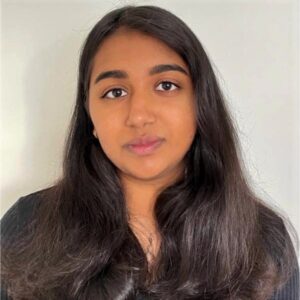
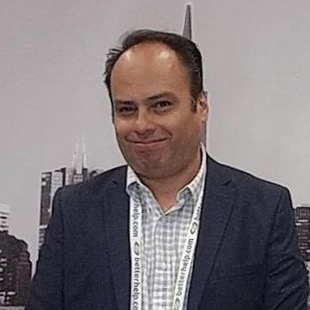

Dear Colleagues and Friends,
Welcome to this edition of our Division 52 newsletter! This issue highlights the APA 2024 Convention in Seattle, held this past August. It was a tremendous success as our Global Dialogues sessions provided invaluable opportunities for international collaboration, highlighting the importance of cultural exchange in addressing today’s global challenges. Kudos to our convention co-chairs Carlos Zalaquett and Theo Lazarus for the amazing work they did to ensure an international presence in our virtual programming. Looking ahead, we are already preparing for APA 2025 in Denver, Colorado. We encourage you to begin preparing your abstracts for submission.
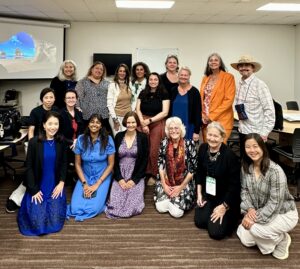
We’d also like to extend a special congratulations to this year’s APA awardees. Their outstanding contributions to international psychology inspire us all, and we encourage you to celebrate their achievements as you read through this issue. As always, we are deeply grateful to all who contributed to this newsletter. Your work continues to push the boundaries of what we can achieve together in the field of international psychology.
With gratitude and joy,
Joyce, Neha, Antonio, and Gabriel
Please email questions, comments, or suggestions to ipbdiv52@gmail.com. The deadline for submissions for the January issue is Dec 15th, 2024. The link to the submission guidelines can be found here.


